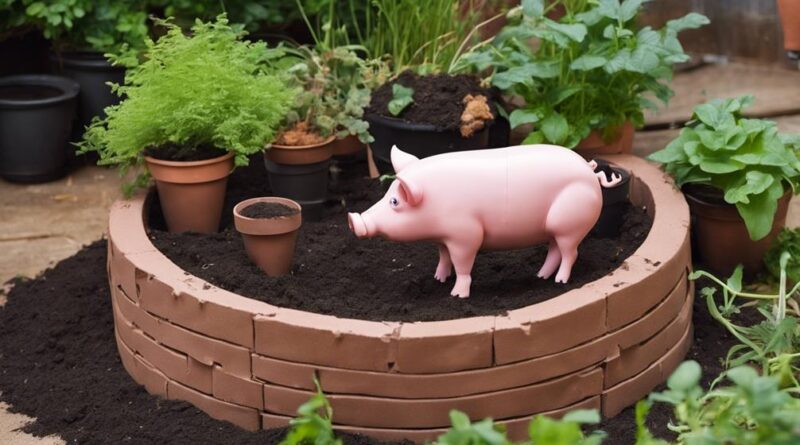3 Best Eco-Friendly Uses for Pig By-Products
When it comes to sustainable practices, pig by-products are like a treasure trove waiting to be unearthed. From fertilizers to biogas production, the possibilities are vast.
But what are the top three eco-friendly uses that stand out above the rest? Stay tuned to discover innovative ways in which pig by-products can be harnessed to benefit both the environment and society.
Sustainable Pig By-Product Fertilizers
When looking for sustainable fertilizers, consider utilizing pig by-products for an eco-friendly alternative. Pig by-product fertilizers offer significant benefits for soil enrichment and sustainable agriculture practices. These fertilizers are an excellent example of nutrient recycling, providing environmental benefits while reducing waste.
Pig by-products are rich in essential nutrients such as nitrogen, phosphorus, and potassium, which are vital for plant growth. When used as fertilizers, these by-products enhance soil fertility, promoting healthier plant growth and higher crop yields. By incorporating pig by-product fertilizers into your farming practices, you can improve soil structure, water retention, and nutrient availability, all of which are crucial for sustainable agriculture.
In addition to soil enrichment, pig by-product fertilizers contribute to environmental sustainability by reducing the need for chemical fertilizers. By utilizing these natural fertilizers, you can minimize the negative impact of synthetic chemicals on soil quality and water systems. This shift towards organic fertilizers not only benefits your crops but also supports a healthier ecosystem overall.
Pig By-Product Biogas Production
Curious about how pig by-products can be harnessed for biogas production in an eco-friendly manner? Pig by-products have significant biogas potential, offering various environmental benefits. By utilizing pig waste for biogas production, you contribute to renewable energy generation and waste reduction simultaneously.
Biogas production from pig by-products involves a process where organic matter, such as manure, is broken down by bacteria in an oxygen-free environment, resulting in the release of biogas. This biogas primarily consists of methane and carbon dioxide, which can be used as a sustainable energy source. The environmental benefits of this process are twofold. First, it helps in reducing greenhouse gas emissions by capturing methane that would otherwise be released into the atmosphere. Second, it provides a renewable energy source that can replace fossil fuels, further contributing to mitigating climate change.
Additionally, biogas production from pig waste aids in waste reduction by effectively managing and utilizing organic waste that would otherwise be a disposal challenge. This process promotes a circular economy approach, where resources are reused efficiently, aligning with the principles of sustainability and environmental stewardship. Overall, harnessing pig by-products for biogas production is a practical and eco-friendly solution with positive impacts on both energy production and waste management.
Utilizing Pig By-Products in Composting
Harnessing pig by-products for biogas production not only contributes to renewable energy generation and waste reduction but also extends to utilizing them in composting for further environmental benefits. When pig by-products are used in composting, it leads to significant advantages for both the environment and agricultural practices.
- Composting benefits:
- Pig manure is rich in nutrients like nitrogen and phosphorus, enhancing soil fertility.
- The compost created from pig by-products helps improve soil structure, water retention, and aeration.
- It reduces the need for chemical fertilizers, thereby promoting organic farming practices.
- Composting pig waste helps in diverting organic material from landfills, reducing methane emissions.
Eco-Friendly Pig By-Product Feeds
Using pig by-products to create eco-friendly feeds is a sustainable practice that benefits both the environment and the livestock industry. By incorporating eco-friendly feed additives derived from pig by-products, farmers can enhance the nutritional value of livestock feed while reducing waste and promoting sustainable agriculture practices.
Pig by-product feed innovations have led to the development of high-quality feeds that offer a balanced mix of essential nutrients for various animals. These feeds not only help in improving animal health but also contribute to the efficient utilization of resources. Utilizing pig by-products in farming reduces the environmental impact of traditional feed production methods, making it a more eco-friendly option for livestock farmers.
Incorporating pig by-products into feed formulations helps in minimizing food waste and maximizing resource efficiency. These sustainable practices not only benefit the environment by reducing the carbon footprint of the livestock industry but also support the circular economy model by utilizing agricultural by-products effectively.
Pig By-Product Leather Alternatives
Exploring sustainable alternatives to traditional leather production, pig by-products offer a promising solution for eco-conscious consumers seeking cruelty-free materials. When looking for eco-friendly leather alternatives, considering vegan leather made from pig by-products is a great option. Here are some key points to consider:
- Vegan Leather Alternatives: Pig skin can be processed into a material that closely resembles traditional leather, providing a cruelty-free option for those looking to avoid animal products.
- Sustainable Farming: By utilizing pig by-products for leather production, we can promote sustainable farming practices that make use of the entire animal, reducing waste and maximizing resource efficiency.
- Biodegradable Leather: Leather made from pig by-products can be designed to be biodegradable, offering an environmentally friendly alternative to traditional leather that often takes a long time to decompose.
- Waste Reduction: Repurposing pig by-products for leather production helps reduce waste in the meat industry, turning what would be discarded materials into valuable and useful products.
Pig By-Product Biofuel Applications
To further expand on the eco-friendly uses of pig by-products, consider the application of pig by-products in biofuel production. Pig by-products, often overlooked, can play a crucial role in biofuel innovations and the development of renewable energy sources.
Pig fat, also known as lard, is a valuable resource that can be converted into biodiesel, a cleaner-burning alternative to traditional fossil fuels. The process involves extracting the fat from the by-products and then transforming it into biodiesel through a chemical reaction called transesterification. This biofuel can be used to power vehicles, machinery, and even heating systems, reducing greenhouse gas emissions and dependence on non-renewable resources.
Furthermore, pig manure can be utilized to produce biogas, another form of biofuel. Through anaerobic digestion, the organic matter in pig waste breaks down, releasing methane gas that can be captured and used as a renewable energy source. This not only helps to manage waste more sustainably but also generates clean energy for various applications.
Pig By-Product Soap Making

Pig by-products can be repurposed creatively in the production of soap, offering a sustainable alternative to traditional soap ingredients. By incorporating natural pig by-products into soap making, you can contribute to eco-friendly practices while enjoying the benefits of these unique ingredients.
Here are some ideas for using pig by-products in soap making:
- Utilize pig fat: Rendered pig fat, also known as lard, can be used as a base in soap recipes, providing moisturizing properties and a creamy lather.
- Incorporate pig collagen: Collagen extracted from pig skin can enhance the skin-conditioning properties of the soap, promoting elasticity and hydration.
- Add pig bone char: Pig bone char, a natural exfoliant, can be incorporated into soaps to gently remove dead skin cells and impurities.
- Include pig milk: Pig milk, rich in vitamins and minerals, can be used in soap formulations to nourish and soothe the skin.
Exploring these options allows you to create unique soaps that aren't only beneficial for your skin but also help reduce waste by utilizing pig by-products creatively. Additionally, these soaps can be a great alternative for individuals looking for natural skincare products that are gentle on the skin and environmentally friendly.
Pig By-Product Organic Fertilizer Options
If you're looking to continue utilizing pig by-products in an eco-friendly manner, consider exploring Pig By-Product Organic Fertilizer Options to maximize sustainability and reduce waste further. One effective method is vermicomposting, which involves using earthworms to break down organic materials into nutrient-rich compost. By feeding pig manure to the worms, you can create a potent fertilizer that's excellent for soil enrichment.
Vermicomposting offers several benefits for sustainable agriculture. The process helps convert pig manure into vermicompost, a natural fertilizer that's rich in essential nutrients like nitrogen, phosphorus, and potassium. This nutrient-dense compost enhances soil structure, improves water retention, and promotes healthy plant growth. Additionally, vermicomposting reduces the volume of pig waste, minimizing environmental pollution and odors associated with traditional manure management practices.
In addition to vermicomposting, there are other soil enrichment methods that utilize pig by-products. For instance, composting pig manure with other organic materials like food scraps, yard waste, and straw can create a balanced fertilizer for gardens and crops. This composting process helps recycle nutrients, reduces the need for chemical fertilizers, and promotes sustainable farming practices. By incorporating pig by-product organic fertilizers into your gardening routine, you can support eco-friendly agriculture while minimizing waste and improving soil health.
Frequently Asked Questions
Are There Any Health Risks Associated With Using Pig By-Products in Eco-Friendly Applications?
Using pig by-products in eco-friendly applications can raise health concerns due to potential contamination or allergic reactions. Ethical considerations should also be taken into account regarding animal welfare and farming practices.
However, when sourced responsibly, pig by-products can offer sustainable and innovative solutions, such as biofuel production or biodegradable packaging.
How Can Individuals or Businesses Access Pig By-Products for Sustainable Use?
To access pig by-products for sustainable use, consider forming farm partnerships for waste reduction. Join community programs that promote resource utilization. These avenues can provide you with access to pig by-products while supporting eco-friendly practices.
Are There Any Regulations or Guidelines in Place for Utilizing Pig By-Products in Eco-Friendly Ways?
When it comes to utilizing pig by-products in eco-friendly ways, you should ensure regulatory compliance and follow sustainable practices. Understanding the rules and guidelines set by authorities is crucial to avoid any legal issues.
What Are the Environmental Benefits of Using Pig By-Products in These Alternative Applications?
Reducing waste and promoting sustainability by using pig by-products in alternative applications brings numerous environmental benefits. By repurposing these materials, you help minimize landfill contributions and lower greenhouse gas emissions.
This eco-friendly practice supports a circular economy where resources are utilized efficiently and waste is minimized. Embracing these innovative uses not only benefits the environment but also contributes to a more sustainable future for generations to come.
Can Pig By-Products Be Used in Urban Settings for Eco-Friendly Purposes?
In urban gardening, pig by-products can play a crucial role. By composting these materials, you contribute to waste reduction and effective resource utilization.
The nutrients present in pig by-products can enrich the soil in urban settings, aiding in plant growth and sustainability.
This eco-friendly practice not only promotes a greener environment in cities but also showcases the potential of using animal waste in a beneficial manner.
Conclusion
In conclusion, pig by-products offer a variety of eco-friendly uses that can benefit both the environment and society. From fertilizers to biogas production to leather alternatives, there are numerous sustainable options for utilizing these by-products.
By incorporating these practices into our daily lives, we can help reduce waste, promote sustainability, and create a more environmentally friendly world for future generations.
So next time you think about pig by-products, consider their potential for positive impact on the planet.
